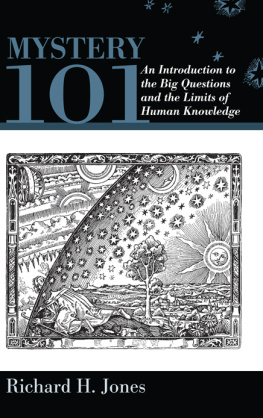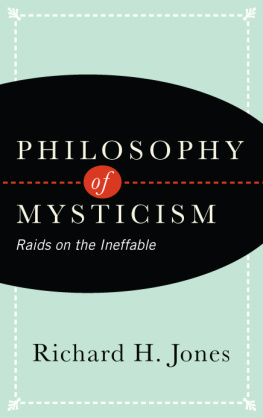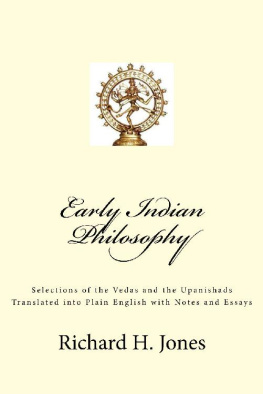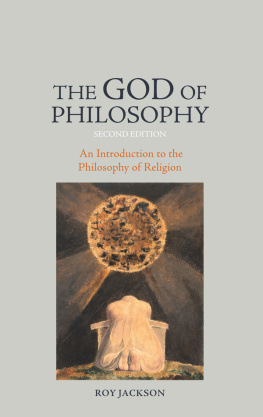MYSTERY
MYSTERY
101
An Introduction
to the Big Questions
and the Limits
of Human Knowledge
Richard H. Jones
Cover art: Camille Flammarion, Latmosphre: mtorologie populaire (1888).
Published by State University of New York Press, Albany
2018 State University of New York
All rights reserved
Printed in the United States of America
No part of this book may be used or reproduced in any manner whatsoever without written permission. No part of this book may be stored in a retrieval system or transmitted in any form or by any means including electronic, electrostatic, magnetic tape, mechanical, photocopying, recording, or otherwise without the prior permission in writing of the publisher.
For information, contact State University of New York Press, Albany, NY
www.sunypress.edu
Production, Jenn Bennett
Marketing, Anne M. Valentine
Library of Congress Cataloging-in-Publication Data
Names: Jones, Richard H., 1951 author.
Title: Mystery 101 : an introduction to the big questions and the limits of human knowledge / Richard H. Jones.
Description: Albany, NY : State University of New York, 2018. | Includes bibliographical references and index.
Identifiers: LCCN 2017008962 (print) | LCCN 2017050117 (ebook) | ISBN 9781438468228 (e-book) | ISBN 9781438468211 (hardcover : alk. paper)
Subjects: LCSH: Knowledge, Theory of.
Classification: LCC BD201 (ebook) | LCC BD201 .J66 2018 (print) | DDC 121dc23
LC record available at https://lccn.loc.gov/2017008962
10 9 8 7 6 5 4 3 2 1
Contents
Preface
Sooner or later, life makes philosophers of us all.
Maurice Riseling
At one time or another, we have all pondered at least some of the Big Questions of philosophy and scienceWho am I? Why do I exist? Why does anything exist at all? Many books attempt to supply answers to these questions, but the most basic philosophical issue receives only scant attention: Are we even in a position to answer such questions? I will examine this basic question and support the unpopular view that we are not currently in a position to answer the really Big Questions in philosophy and science, and probably never will be. There are limits to human knowledge of one kind or another that we simply cannot get around. This leads to agnosticism. Agnosticism is commonly maligned as wishy-washya refusal to take a stand on an issue due to lack of interest or intellectual cowardice. However, agnosticism is a philosophically defensible stance, and I will maintain that it is in fact the only intellectually honest position for us in our epistemic situation concerning the Big Questions. In sum, the objective of this book is to expose the limits to human knowledge in the area of the Big Questions, thereby revealing that we should be more perplexed concerning the basic nature of reality than we normally suppose.
The book is written as a collection of short introductions. My approach is from a general analytic philosophical perspective rather than from one of the more specific contemporary schools (e.g., pragmatism or process philosophy). I presume some familiarity with philosophy, but not much.
I hope the positions taken here will provoke the reader to further reflection. The only thing I distinctly remember from any of my high school science classes is one day in physics class when we students were responding with the correct answers from the book. The teacher stopped and stared at us for a moment and then picked up a blackboard eraser and threw it against the wall. We students looked at each other, wondering what we had done wrong. Then the teacher said: Why did that eraser continue to move after it left my hand? If you think its obvious and doesnt need an explanation, then you are not thinking like scientists, and I want you to think like scientists, not just parrot back answers! Then he gave us a brief lecture on answers to that question from Aristotle to Newton. I want this book to be like that flying eraser. I hope you start to think about the Big Questions if you havent already done so or honestly to examine your own deeply held assumptions and any answers you have already given.
Philosophy of Mystery
The most beautiful experience we can have is the mysterious. It is the fundamental emotion which stands at the cradle of all true art and science. Whoever does not know it and can no longer wonder, no longer marvel, is as good as dead, and his eyes are dimmed.
Albert Einstein
W hat dont we currently know about our situation in the world? And what cant we know in principle? What is unknowable in principle about reality constitutes philosophical mysteries. These are not historical mysteries that we are not in a position today to answer, nor are they like the mysteries in murder novelsthey are mysteries about the fundamental nature of reality that we do not currently know even how to approach. Whether we are in the position to crack the mysteries surrounding the Big Questions of philosophy and science is the subject of this book.
One might argue that all philosophical issues are mysteries since basic issues in philosophy today are unresolvedindividual philosophers may believe they have resolved the issue of, say, the relation of our mind to our body, but their opponents are not convinced and instead advance well-argued counterpositions. However, many philosophical issues do not touch the Big Questions about being human and about the natural world that most people with a philosophical bent think of when they contemplate the reality of their lives and our world; instead, philosophers today most often busy themselves with more technical matterssuch as, whether propositions or possibilities are realthat are at best only very distantly related to the Big Questions. When people reflect on their existence and keep pushing for deeper explanations, they end up with these central mysteries:
Where did we come from, and why are we here? Why do we suffer? Do our lives have an objective meaning? Are our moral, intellectual, and aesthetic values objective parts of reality, or are they only our own creations?
What is fundamentally real in a human being? Is our apparent consciousness really nothing but material events? Do we survive death?
Are all actions determined by physical forces alone, or do we have free will?
Do we have any genuine knowledge of reality as it exists in itself, or do our claims even in science merely reflect our cultural or personal interests?
Does a creator god or other alleged transcendent realities exist?
Why does anything exist at all?
This book will identify todays key mysteries and some of the answers given by philosophers, but its main thrust is a deeper philosophical question: Are we capable of supplying well-grounded answers to these questions, or at least of reducing them to more manageable problems? Or are these questions we are posing questions that we simply cannot answer? That is, the objective here is not to canvas all the positions today on a given mystery and try to determine which is currently the best option, but to determine whether we have the mental and technologically enhanced capacities to dispel the mystery, at least in principle. For example, when it comes to the meaning of life, no particular answer will be defended here; rather, the issue here is what that question means exactly, and are we in a position to know whether there is in fact a meaning of life? In short, this book asks whether we can answer the Big Questions at all. In that way, this is a work in metaphilosophy.









